For No Reason Whatsoever Here’s A Reminder That If You Consider Yourself A Leftist/punk/abolitionist/anarchist/radical
for no reason whatsoever here’s a reminder that if you consider yourself a leftist/punk/abolitionist/anarchist/radical in any sort of way and get called into jury duty, you are to become the most square person on earth during the jury questionnaire!!!
don’t be that guy who says fuck the police in the jury questionnaire! that just gets you sent home! if you want to generate change, interact with the case and use your jury vote for good! ESPECIALLY if it’s a high profile case!
More Posts from Thehorrorsarehere and Others
chapter 20 of htn is short but has so much weight to it. the entirety of the chapter is this: the whole family watches and cleans up and does nothing else while harrow gets violated over and over again by her eldest brother, at the behest of her father.

the chapter begins with gideon penetrating harrow's pelvis, then god makes her whole again, yet claims powerlessness.

he calls her to his rooms and insists she consume things she does not like and does not want, and she does it, because she has nowhere else to go, no one else to turn to, and no other form of protection.

the chapter ends with harrow seeking physical solace from the body: a woman, her silent caretaker, john's original victim,

and then it is revealed to us that the poem john recites to harrow is the poe verse at heart of humbert humbert's (of nabakov's lolita) backstory.
i really love the way tamsyn muir navigates incest and sexual violence here. it is inarguable that harrow the ninth is a family drama; john is a patriarch in every sense of the word: a divine patriarch, a scholarly father-figure, and a literal father; harrow's narration posits him as fatherly, ianthe's dialogue refers to him as such, the other lyctors half-jokingly call him daddy; the lyctors dutifully call each other brother and sister. they are god's children, in that he made them, literally or hegemonically, and as both lyctors and theocratic royalty, they interpret god's will. they have a religious compulsion to follow john's orders and to not question him. the lyctor's familial titles call to christian ecclesiastical titles of sister, brother, and father. john uses his self-appointed divine right and the historical hierarchy of the catholic church to perpetuate systematic violence and allegorical rape against harrowhark. john lived out a jesus narrative, coopted historical european aesthetics, political structures, and religion, recreated the catholic church with necromancy as religious praxis, and is now cycling through the historic legacy of that very system—and in this chapter, and harrow the ninth as a whole, the macro becomes the micro. this family dynamic is just a minute example of what is happening empire-wide.
on a non-religious note: i recently read the incest diary by anonymous, and this chapter reminded me of a few sections of that book where the author details moments where she brings up her incestuous abuse from her father to her family: her mother ignores her, just as she has ignored this fact for the author's entire life; her brother refuses to believe her and threatens to kill himself; her close family friend instructs her to never bring it up again, claiming that it happens to all women and that the author should get over it. mercymorn's callous caretaking of harrow in the previous chapter after gideon's first attack on her reminds me of this, as well as ianthe's mean-spirited snickering. the women in harrow's life reluctantly take care of her in the aftermath (if the family friend is to be believed, this happens to all women; it is entirely believable to me that both mercy and ianthe have been victims of sexual violence as well), and john heals her only to then put her in situations where she cannot say no to him. throughout the book, he steadily defiles her boundaries and backs her into emotional corners where she must confess to him, all the while using the threat of constant violence to keep her weak and scared. the physical is just a small part of the incestuous abuse happening in htn—so much of it is psychological, and it's psychological coming from the entire family. harrow's brother and sisters keep her from completely perishing under the weight of these attacks, but only just. and in doing this, they only enable john's abuse.
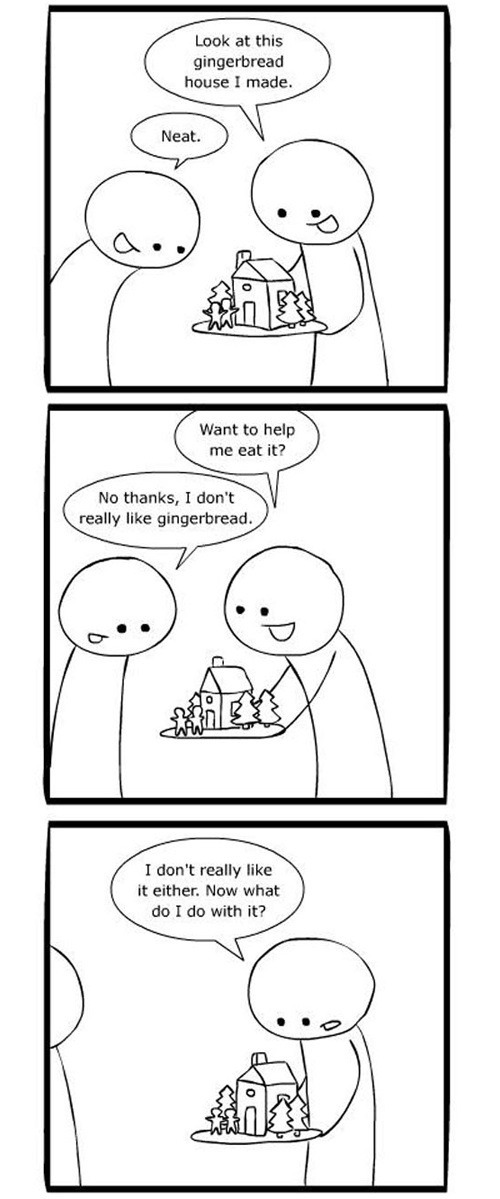

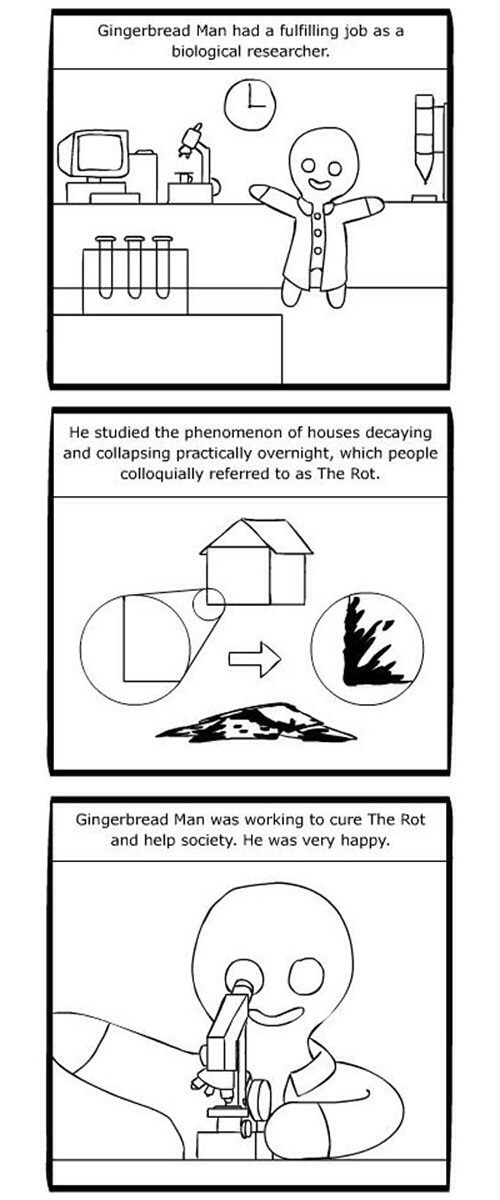
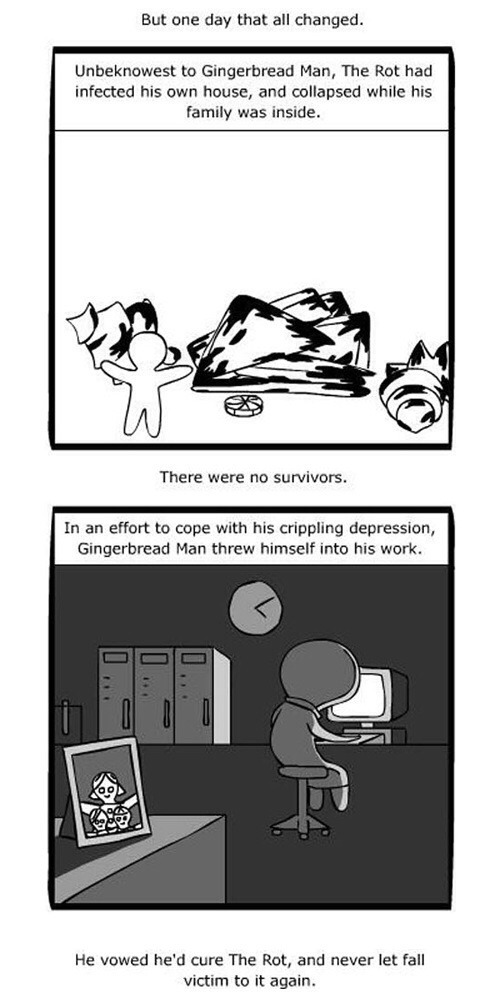
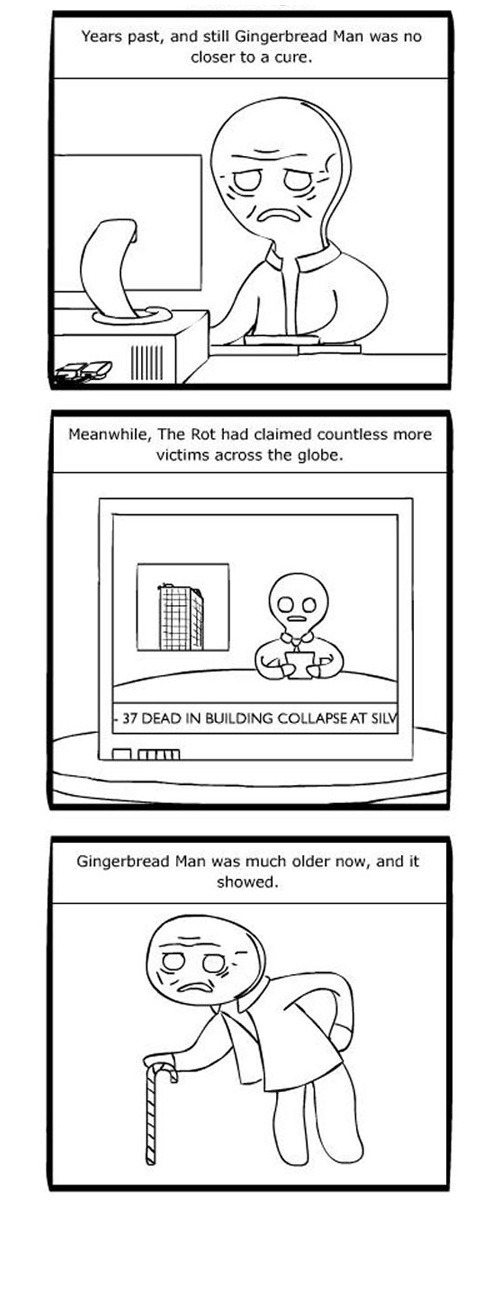
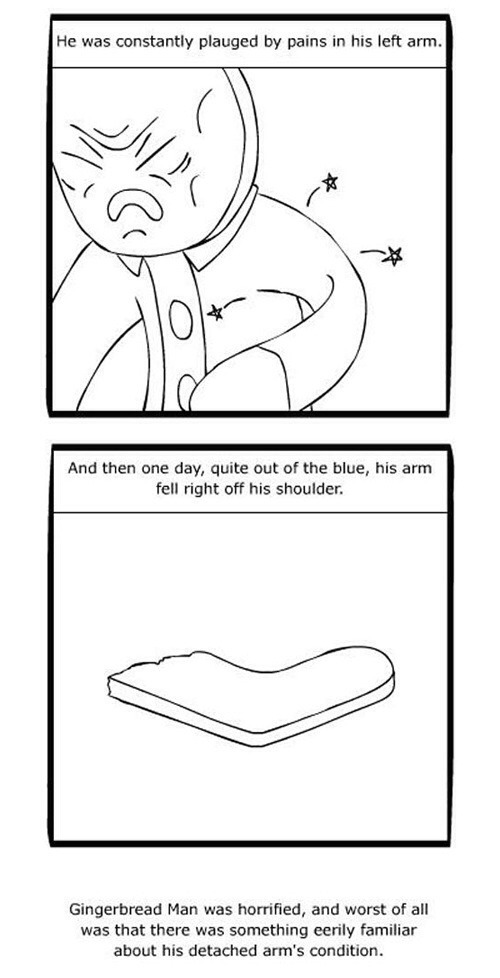
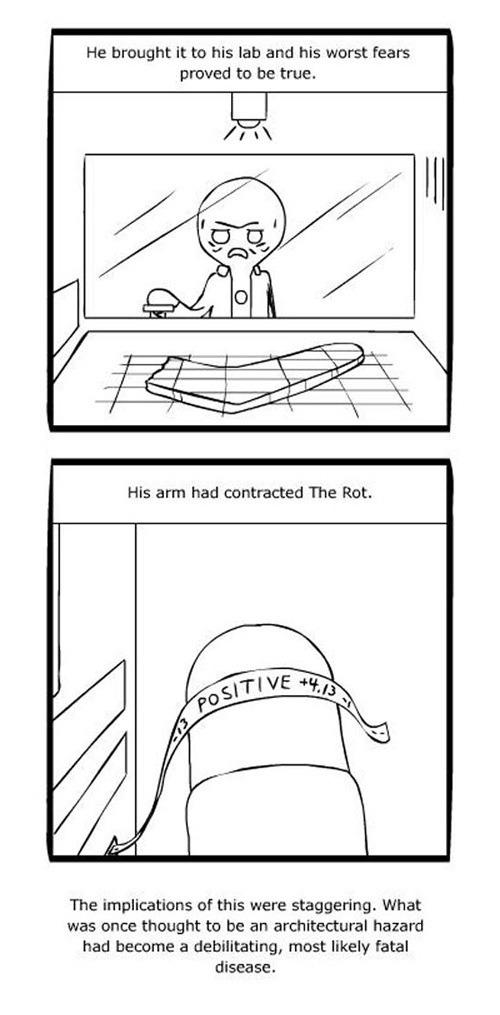
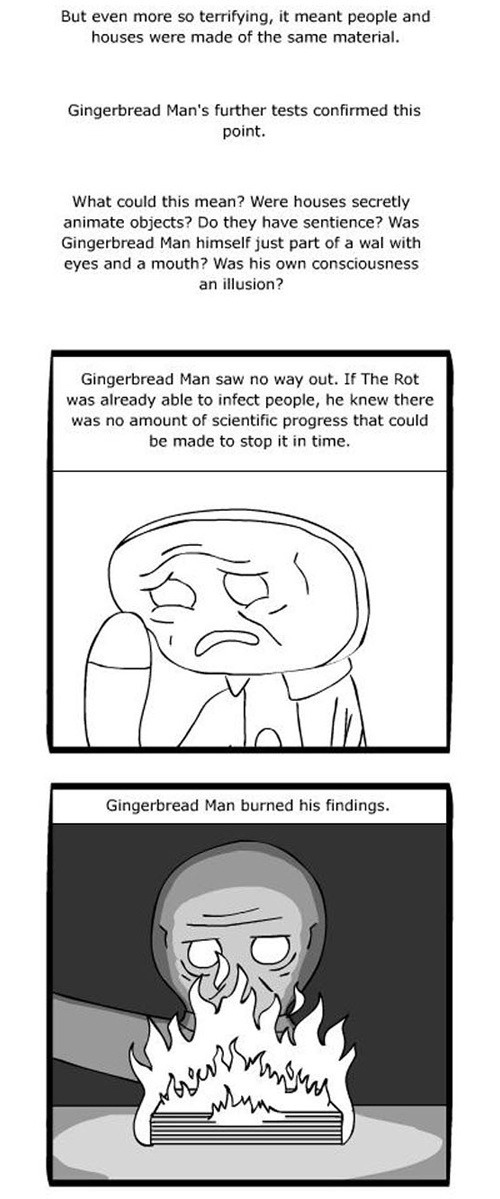
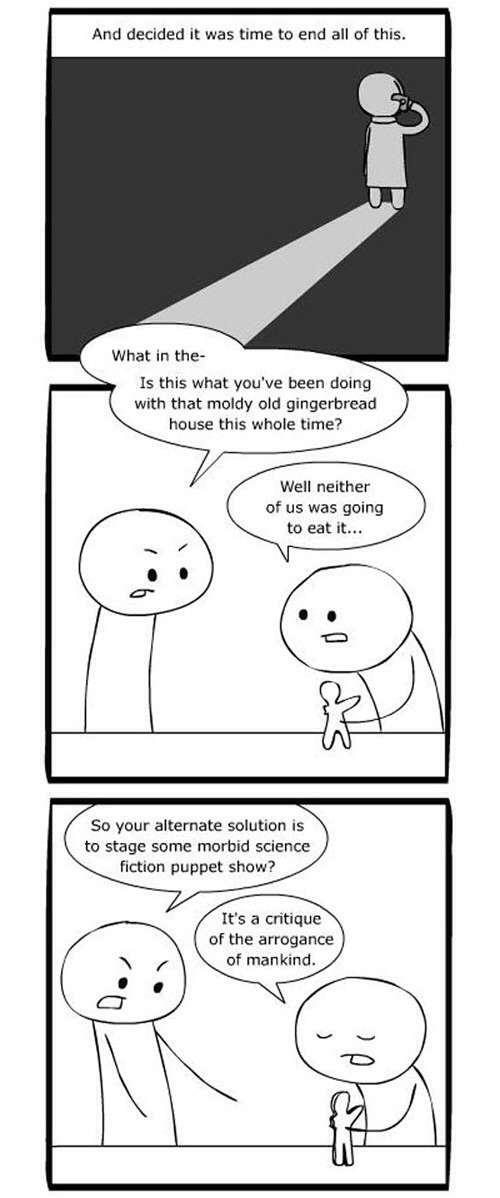

Every time Sean Astin makes a statement on whether or not Sam and Frodo were indeed gay for each other in lord of the rings he’s always like “well we have to acknowledge that attitudes around sexuality have changed dramatically over the past several decades and since authorial intent is only up to speculation, the story is open to multiple readings, some of which might have different significances for different groups of people also they kiss on the lips because I said so”
harrow as a contestant in a cooking show

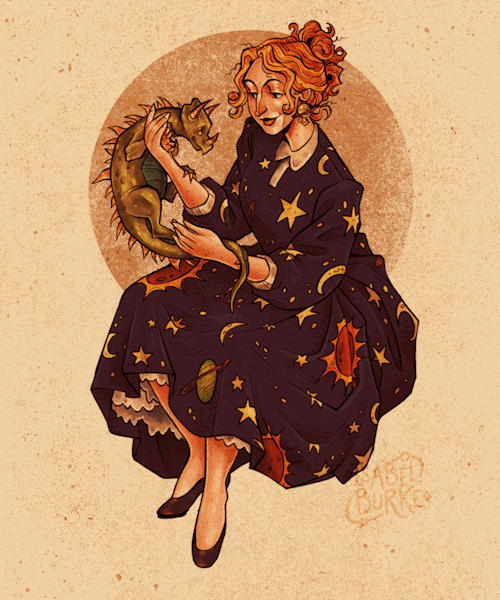
you think you’re going to have a normal field trip and she shows up wyd (cw *slight* flashing images)
✦ find me on instagram @the.flightless.artist ✦

▶BGM:Insight XXIII ◀

when i started watching Dead Boy Detectives, i was not expecting Edwin of all characters to have the funniest and most banger lines- like, just off the top of my head:
"she can go find that insolent little girl Emma and go take Polaroids in a graveyard or some nonsense."
"now, if she had died last night, i'd have no issue with her being here."
"perhaps it's your outfit."
"police don't know what to do with A FUCKING WITCH!!"
(sing-song tone) "that is not what i said..."
"what exactly is your malady today, Charles?"
"even if that were true, you're a bloody CROW!!"







MATT MURDOCK + Reddit Comment Reactions to that One Iconic Matt Tweet
BONUS:

maybe i'm missing something, but why wouldn't you listen to a doctor's opinion of whether you're in pain or fatigue?
Okay, I’ve thought about this question for most of a day, because the obvious answer is “….why would I?”, but it’s clearly not obvious to you.
Now, I know exactly what you’re thinking. They’re a doctor. They’re a professional you’ve gone to for help. And pain and fatigue are, like, medical things, right? Going to a doctor about medical stuff and then saying “LOL NOPE” to what the doctor says is like hiring a plumber and then arguing about how to fix your sink, right? If you’re so smart, why’d you call the plumber over?
Okay.
But now imagine your basement is flooding and you call the plumber. While on the phone, the plumber asks you what the problem is and you say that there’s a pipe in your basement that’s burst and it’s now flooded.
And the plumber—still on the phone—says “LOL NOPE.”
And you say, “Excuse me?”
The plumber says, “Look, a flooded basement is a really severe problem, okay? Usually, these calls, they’re a clogged toilet or a leaky u-bend under the sink. Trust me, this is better. Those are a lot cheaper to fix.”
And you say, “I’m sure they are, but I’m telling you, my basement is flooded. I’m looking down the stairs and I can see the water.”
“I’m just saying, there are other things it could be. It won’t hurt anything to eliminate them first,” the plumber says.
And you say, “But I need my basement fixed! Look, I can’t go down in my basement and do laundry right now, and I have important keepsakes down there in boxes… some of them are already ruined, but maybe I can salvage some if we can just fix the problem.”
“Well, then it will be in your interest for me to check your toilets and your u-bends,” the plumber says.
“The problem is not in my toilets or my sinks,” you say. “I am looking at the problem. I called you because my basement is flooded, and I need you to help me fix that.”
And then… now, I’m not assuming you’re female, but I just want to emphasize that this is a starkly though not exclusively gendered phenomenon, so if you’re not female then imagine you are.
“MA’AM,” the plumber says, in a way you recognize. It’s the voice of putting you in your place, the voice of unearned authority, and with this voice, this word, ma’am, is not a title of respect, it’s a reminder and a command. “MA’AM, if you’ll just calm down. I’m sure what you’re experiencing seems terrible to you, but the truth is, it’s probably not as bad as it looks from where you’re standing. And that’s a good thing! Trust me, have been a plumber for 27 years. Now, when can I come over to check your u-bends?”
“It’s not my u-bends!” you say.
“Ma’am, if you don’t want to be helped, I’ll start to think you’re calling for attention.”
You see?
(Now for bonus points, imagine the plumber refuses to help you until you lose a statistically improbable amount of weight just to rule out that this might be flooding your basement, or is acting on the subconscious but deeply entrenched idea that people with your skin color are less susceptible to flooding and in less need of help, or believes that as a feeeemale you’re more likely to be suffering from emotional distress than a physical problem and suggests the preferable course of action would be for you to take a nap every time the supposed flooding in your basement bothers you.)
As I said in that post, pain and fatigue — like dysphoria — are qualitative experiences. This means they happen in your head and they cannot be directly observed or measured by anyone else (which would make them quantitative phenomena).
The doctor talking to you about dysphoria —or pain or fatigue — is not a plumber in your house, they are a plumber on the phone. The only input they receive about the problem is your account of it.
And if they’re not willing to listen to what you say and aren’t willing to take you at your word, then all the expertise and experience in the world doesn’t matter. You can have the most powerful calculator in the world but if you type the wrong numbers into it it will still give the wrong answers. Someone can be the best doctor in the world but if they’re ignoring the information they’re not going to give you the right answer.
-
 getrektneen reblogged this · 2 weeks ago
getrektneen reblogged this · 2 weeks ago -
 didi-and-gogo liked this · 2 weeks ago
didi-and-gogo liked this · 2 weeks ago -
 janmoonie liked this · 2 weeks ago
janmoonie liked this · 2 weeks ago -
 arojerk reblogged this · 2 weeks ago
arojerk reblogged this · 2 weeks ago -
 askfordoodles liked this · 2 weeks ago
askfordoodles liked this · 2 weeks ago -
 galaxia-prince reblogged this · 2 weeks ago
galaxia-prince reblogged this · 2 weeks ago -
 galaxia-prince liked this · 2 weeks ago
galaxia-prince liked this · 2 weeks ago -
 hairspray-heart reblogged this · 2 weeks ago
hairspray-heart reblogged this · 2 weeks ago -
 awesometisim liked this · 2 weeks ago
awesometisim liked this · 2 weeks ago -
 daydreamsofsummer reblogged this · 2 weeks ago
daydreamsofsummer reblogged this · 2 weeks ago -
 inkfowl reblogged this · 2 weeks ago
inkfowl reblogged this · 2 weeks ago -
 inkfowl liked this · 2 weeks ago
inkfowl liked this · 2 weeks ago -
 whymsie-theautumnprince liked this · 2 weeks ago
whymsie-theautumnprince liked this · 2 weeks ago -
 fillertumblername liked this · 2 weeks ago
fillertumblername liked this · 2 weeks ago -
 mieltelecheycrema liked this · 2 weeks ago
mieltelecheycrema liked this · 2 weeks ago -
 boycreature12 liked this · 2 weeks ago
boycreature12 liked this · 2 weeks ago -
 screamingcicada reblogged this · 2 weeks ago
screamingcicada reblogged this · 2 weeks ago -
 screamingcicada liked this · 2 weeks ago
screamingcicada liked this · 2 weeks ago -
 thelastdovahkiin reblogged this · 2 weeks ago
thelastdovahkiin reblogged this · 2 weeks ago -
 thelastdovahkiin liked this · 2 weeks ago
thelastdovahkiin liked this · 2 weeks ago -
 mundanesalad liked this · 2 weeks ago
mundanesalad liked this · 2 weeks ago -
 samforgoragain liked this · 2 weeks ago
samforgoragain liked this · 2 weeks ago -
 rileyanorablackthorne reblogged this · 2 weeks ago
rileyanorablackthorne reblogged this · 2 weeks ago -
 kit-tsakirimori reblogged this · 2 weeks ago
kit-tsakirimori reblogged this · 2 weeks ago -
 leajoyrambles liked this · 2 weeks ago
leajoyrambles liked this · 2 weeks ago -
 big-pp-energy-ven reblogged this · 2 weeks ago
big-pp-energy-ven reblogged this · 2 weeks ago -
 big-pp-energy-ven liked this · 2 weeks ago
big-pp-energy-ven liked this · 2 weeks ago -
 love-bites-and-poetry-burns reblogged this · 2 weeks ago
love-bites-and-poetry-burns reblogged this · 2 weeks ago -
 love-bites-and-poetry-burns liked this · 2 weeks ago
love-bites-and-poetry-burns liked this · 2 weeks ago -
 metalarchfiend liked this · 2 weeks ago
metalarchfiend liked this · 2 weeks ago -
 ollie-duck reblogged this · 2 weeks ago
ollie-duck reblogged this · 2 weeks ago -
 ollie-duck liked this · 2 weeks ago
ollie-duck liked this · 2 weeks ago -
 soft-zen liked this · 2 weeks ago
soft-zen liked this · 2 weeks ago -
 soft-zen reblogged this · 2 weeks ago
soft-zen reblogged this · 2 weeks ago -
 str1ngsss reblogged this · 2 weeks ago
str1ngsss reblogged this · 2 weeks ago -
 str1ngsss liked this · 2 weeks ago
str1ngsss liked this · 2 weeks ago -
 aerllette reblogged this · 2 weeks ago
aerllette reblogged this · 2 weeks ago -
 aerllette liked this · 2 weeks ago
aerllette liked this · 2 weeks ago -
 dekulakization liked this · 2 weeks ago
dekulakization liked this · 2 weeks ago -
 shining-dawn reblogged this · 2 weeks ago
shining-dawn reblogged this · 2 weeks ago -
 zombiehunter34 liked this · 2 weeks ago
zombiehunter34 liked this · 2 weeks ago -
 starlightmss liked this · 2 weeks ago
starlightmss liked this · 2 weeks ago -
 prose-among-the-trees reblogged this · 2 weeks ago
prose-among-the-trees reblogged this · 2 weeks ago -
 the-awful-dread-that-leaves reblogged this · 2 weeks ago
the-awful-dread-that-leaves reblogged this · 2 weeks ago -
 baxieblur-turnip reblogged this · 2 weeks ago
baxieblur-turnip reblogged this · 2 weeks ago -
 baxieblur-turnip liked this · 2 weeks ago
baxieblur-turnip liked this · 2 weeks ago -
 anton-exe reblogged this · 2 weeks ago
anton-exe reblogged this · 2 weeks ago -
 lukadjo reblogged this · 2 weeks ago
lukadjo reblogged this · 2 weeks ago -
 silverthedreamergirl reblogged this · 2 weeks ago
silverthedreamergirl reblogged this · 2 weeks ago -
 silverthedreamergirl liked this · 2 weeks ago
silverthedreamergirl liked this · 2 weeks ago